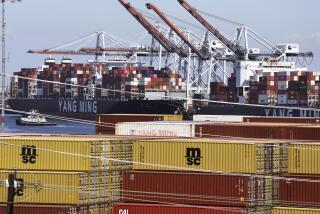Coast Guard Tests Y2K Readiness
- Share via
Hoping to avoid potential cargo delays and economic ripple effects associated with a potential year 2000 computer failure at the region’s ports, the U.S. Coast Guard is conducting a series of exercises to test both its own preparedness and that of ocean freighters and port facilities for problems stemming from the much-anticipated calendar rollover.
One exercise will involve setting the systems clock on one giant cargo vessel forward to Jan. 1, 2000, to see what happens, said Lt. Daniel Deptula of the Coast Guard’s Marine Safety Office in Long Beach. The ports of Long Beach and Los Angeles are also participating in the exercises. “Maritime transportation is a very big part of our national economy,” Deptula said. “Problems associated with that have a large impact.”
Even if the computer aboard the American President Line freighter successfully reads the year 2000 instead of 1900, the Coast Guard will still run through a drill created to help the nation’s maritime police assist vessels hypothetically stricken by Y2K-related engine failure.
Other exercises will involve responding to a hypothetical scenario in which an embedded chip within a valve control system aboard an oil freighter malfunctions and triggers an oil spill. And they will test the Coast Guard’s “non-computer” contingency plans in case of collapse of the ports’ vessel traffic management system.
Results of the exercises and the Coast Guard’s Y2K preparedness guidelines are scheduled to be presented to the public today at a dockside news conference.
Also today, Richard Thomas, senior vice president of American International Group casualty underwriting, will discuss his company’s Y2K preparedness and offer tips on how other businesses can prepare. His remarks are scheduled to conclude a luncheon meeting of Town Hall Los Angeles.
More to Read
Sign up for Essential California
The most important California stories and recommendations in your inbox every morning.
You may occasionally receive promotional content from the Los Angeles Times.













